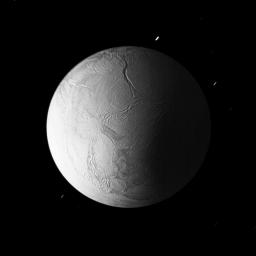
|
Enceladus in Eclipse
- Click the image above for a larger view
- Full-Res JPEG (970 x 970) (49.6 kB)
- Full-Res TIFF (970 x 970) (942.1 kB)
Caption:
In Saturn's shadow, the southern hemisphere of Enceladus is lit by sunlight reflected first off of the rings and then onto the nightside of the planet.
Other sources of illumination include sunlight reflected off Titan, Dione, and Rhea, which, at the time this image was acquired, were all positioned in the same place in the Enceladan sky.
The deep Labtayt Sulci lie at the top of this image, which is nearly centered on the moon's South pole.
While features in the center of this image are in sharp focus, those near the limb appear blurred because the spacecraft was receding from Enceladus at 16 kilometers (10 miles) per second during this long exposure.
The image was taken in visible light with the Cassini spacecraft narrow-angle camera on Oct. 31, 2008 at a distance of approximately 137,000 kilometers (85,100 miles) from Enceladus and at a Sun-Enceladus-spacecraft, or phase, angle of 73 degrees. Image scale is 818 meters (2,682 feet) per pixel.
Background Info:
The Cassini-Huygens mission is a cooperative project of NASA, the European Space Agency and the Italian Space Agency. The Jet Propulsion Laboratory, a division of the California Institute of Technology in Pasadena, manages the mission for NASA's Science Mission Directorate, Washington, D.C. The Cassini orbiter and its two onboard cameras were designed, developed and assembled at JPL. The imaging operations center is based at the Space Science Institute in Boulder, Colo.
For more information about the Cassini-Huygens mission visit http://saturn.jpl.nasa.gov/ . The Cassini imaging team homepage is at http://ciclops.org .
Cataloging Keywords:
| Name | Value | Additional Values |
|---|---|---|
| Target | Enceladus | Dione, Rhea, Titan |
| System | Saturn | |
| Target Type | Satellite | |
| Mission | Cassini-Huygens | |
| Instrument Host | Cassini Orbiter | |
| Host Type | Orbiter | |
| Instrument | Imaging Science Subsystem (ISS) | |
| Detector | Narrow Angle Camera | |
| Extra Keywords | Eclipse, Grayscale, Shadow, Visual | |
| Acquisition Date | ||
| Release Date | 2009-01-07 | |
| Date in Caption | 2008-10-31 | |
| Image Credit | NASA/JPL/Space Science Institute | |
| Source | photojournal.jpl.nasa.gov/catalog/PIA10551 | |
| Identifier | PIA10551 | |
